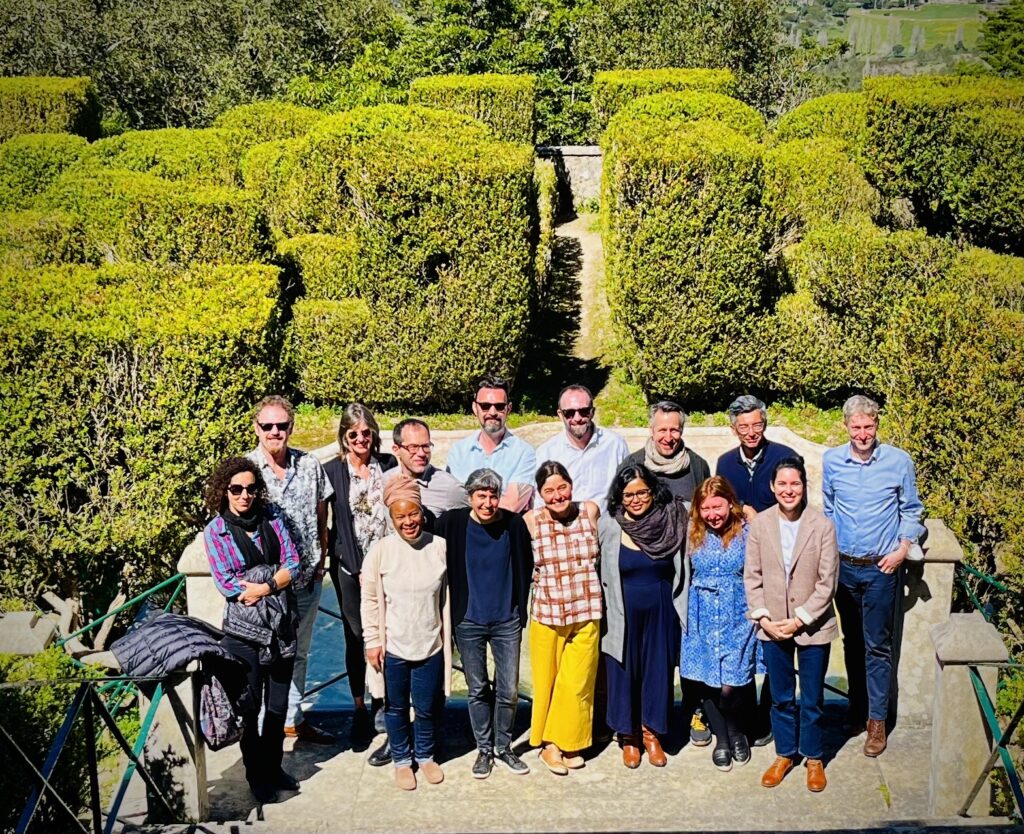Populism: Anthropological Approaches
Date
Mar 20-26, 2023Organized by
William Mazzarella, Robert Samet and Kabir TambarLocation
Tivoli Palacio de Seteais Sintra, PortugalParticipants
- Benjamin Arditi Universidad Nacional Autonoma de Mexico Facultad de Ciencias Politicas y Sociales, Mexico
- Donna Auston Wenner-Gren Foundation, USA
- Banu Bargu University of California, Santa Cruz, USA
- Lisa Bjorkman University of Louisville, USA
- Leticia Cesarino Universidade Federal de Santa Catarina, Brazil
- Luciana Chamorro University of Michigan, USA
- Nusrat Chowdhury Amhert College, USA
- Jason Frank Cornell University, USA
- lnsa Koch London School of Economics and Political Science, UK
- William Mazzarella University of Chicago, USA
- Danilyn Rutherford Wenner-Gren Foundation, USA
- Robert Samet Union College, USA
- Naomi Schiller CUNY Brooklyn College, USA
- Nitzan Shoshan Centro de Estudios Sociologicos El Colegio de Mexico
- Yannis Stavrakakis School of Political Sciences, Aristotle University of Thessaloniki, Greece
- Kristof Szombati Max Planck Institute for Social Anthropology, Germany
- Kabir Tambar Stanford University, USA
- Kerem Ussakli Stanford University, USA
- Gary Wilder The Graduate Center, CUNY, USA
ORGANIZER’S STATEMENT: This symposium fosters an anthropological approach to populism that speaks to the challenge of our contemporary moment. The global resurgence of populism is a defining feature of the twenty-first century, often challenging the conventional left-right polarities that structured politics in the twentieth century. Populist movements today present vitriolic critiques of the liberal settlement that emerged after the end of the Cold War. Among scholars, this new wave of populisms has revived longstanding debates about the concept itself, debates that tend to start from the top down and reproduce what Isaiah Berlin called the Cinderella complex – the belief that “there exists a shoe – the word ‘populism’ – for which somewhere there must exist a foot.” This definitional fixation was one reason that, until quite recently, anthropologists largely refrained from addressing populism. However, the discipline’s traditional foci offer crucial coordinates for understanding some of populism’s most characteristic features: the charisma of political authorities, the appeal to folk authenticity, the feud-like reverberation of grievances, the sacrificial logic of suffering, and the always shifting and contingent articulation of political demands. In this symposium, we seek to explore what resources anthropological theory offers for understanding a politics that elides conventional classifications. The aim is neither to praise populism nor to condemn it, but to parse its temporal ambiguities, to understand its affective energies, and to track its divergent manifestations.
Over the last decade, disparate clusters of anthropologists and ethnographers have begun to converge on themes related to populism. Not all of these scholars address the subject per se, but their research speaks to a historical shift that has transformed the grounds on which the discipline rests. For some this shift only became apparent in the wake of Brexit and the 2016 U.S presidential elections—events that provoked an outpouring of responses within anthropology. However, the current populist revival is much deeper and less sudden than events of the last four years would suggest. So, too, are the possible anthropological contributions to its analysis.
The symposium takes as its starting point what political theorists like Benjamin Arditi, Ernesto Laclau, Francisco Panizza, and Yannis Stavrakakis have called a “symptomatic” approach to populism, an approach that resonates with a distinctively anthropological lineage. Our objective is to draw out these interdisciplinary resonances in a way that deepens anthropological contributions to the study of populism. To that end, the symposium will explore five points of crossover where anthropology is poised to make important interventions into these ongoing debates about populism.
Affect and Aesthetics: Populism foregrounds the affective and aesthetic dimensions of politics. For this reason alone, it is often denigrated as dangerous, immature, and improperly political. What light can populism cast on the constitutive role of affect not just in mass democracy but in social life as such? On the making of authority and collective imagination? Possible topics here might include the charisma of leaders and of the people, sentiment as an idiom of political authenticity, and the simultaneously threatening and vital aspects of crowds.
Linkages, Mediations, Networks: At one level, populism seems to be all about imagining ‘the people.’ But what are the linkages, networks, and mediations that undergird this abstraction in populist politics? What are the infrastructures of populism: how are they similar to/different from those of mainstream representative democracy? By ‘infrastructures’ we mean both the technical assemblages that make ‘the people’ palpable, and the social networks of brokerage and exchange that, from a liberal standpoint, might too quickly appear as ‘corruption.
Reframing the Body Politic: How have contemporary populist movements drawn upon, transformed, or supplanted historical configurations of nationalism? To what extent do critical accounts of race, class, and gender – crucial for earlier interventions in the study of nationalism – remain adequate for understanding how present-day populisms envision a “body politic”? In what ways would such concepts need to be rethought?
Constitutive Others: One hallmark of populism is its reliance on a constitutive other, an offending “Them” upon which the collective “Us” depends. This symposium examines some of the constitutive others that define the current wave of populisms. What tools do we have for thinking about their selection, pursuit, and treatment? How permeable is the external frontier between self and other? Are there shared conditions that give rise to this agonistic pattern of subject formation or do populist movements coalesce out of incommensurable lifeworlds?
Time and Event: Populist movements today are often understood through metaphors richly layered with temporal resonances: of return as much as rupture, of historical memory as much as anticipatory revelation, of past as much as future. What narrative and representational forms position populist movements in historical time? What analytical frameworks help to account for the perception of uncanny repetitions, seemingly anachronistic returns, or unexpected ruptures? How have visions of the future – not only of a territorially circumscribed “people” but of the planet itself – shaped the contemporary populist imagination and the backlash against it?
Wenner-Gren Symposium #162
